Report on Health and Wellbeing of the Workforce in Hospitality
VerifiedAdded on 2019/12/17
|7
|1718
|230
Report
AI Summary
This report presents an executive summary and in-depth analysis of workforce health and wellbeing in the hospitality sector, focusing on the impact of stress, job characteristics, and work-life balance on employee turnover and retention. The research synthesizes findings from various studies, including the impact of stressors, such as heavy workloads and interpersonal tensions, on employee health and wellbeing. It also explores strategies for reducing these stressors, like flexible working arrangements and part-time work, to minimize job stress and improve the quality of working life. The report highlights key findings on the role of job characteristics and features in the hospitality sector and the impact of work-life balance practices on employee retention. It also discusses the role of aggression among chefs and the importance of addressing issues related to work-life balance to create a healthier environment and minimize job stress, offering recommendations for the hospitality industry to improve employee wellbeing and retention.
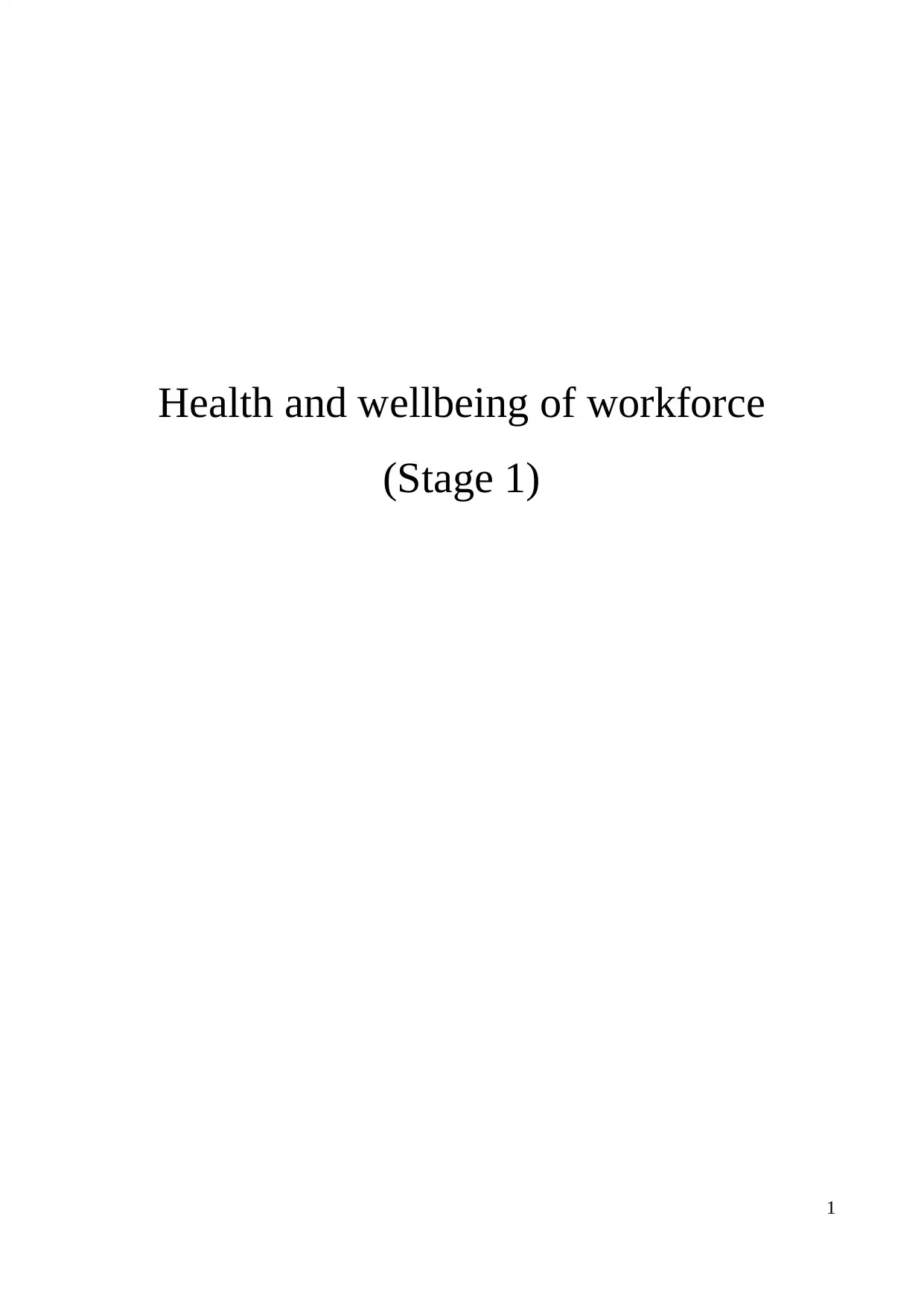
Health and wellbeing of workforce
(Stage 1)
1
(Stage 1)
1
Paraphrase This Document
Need a fresh take? Get an instant paraphrase of this document with our AI Paraphraser
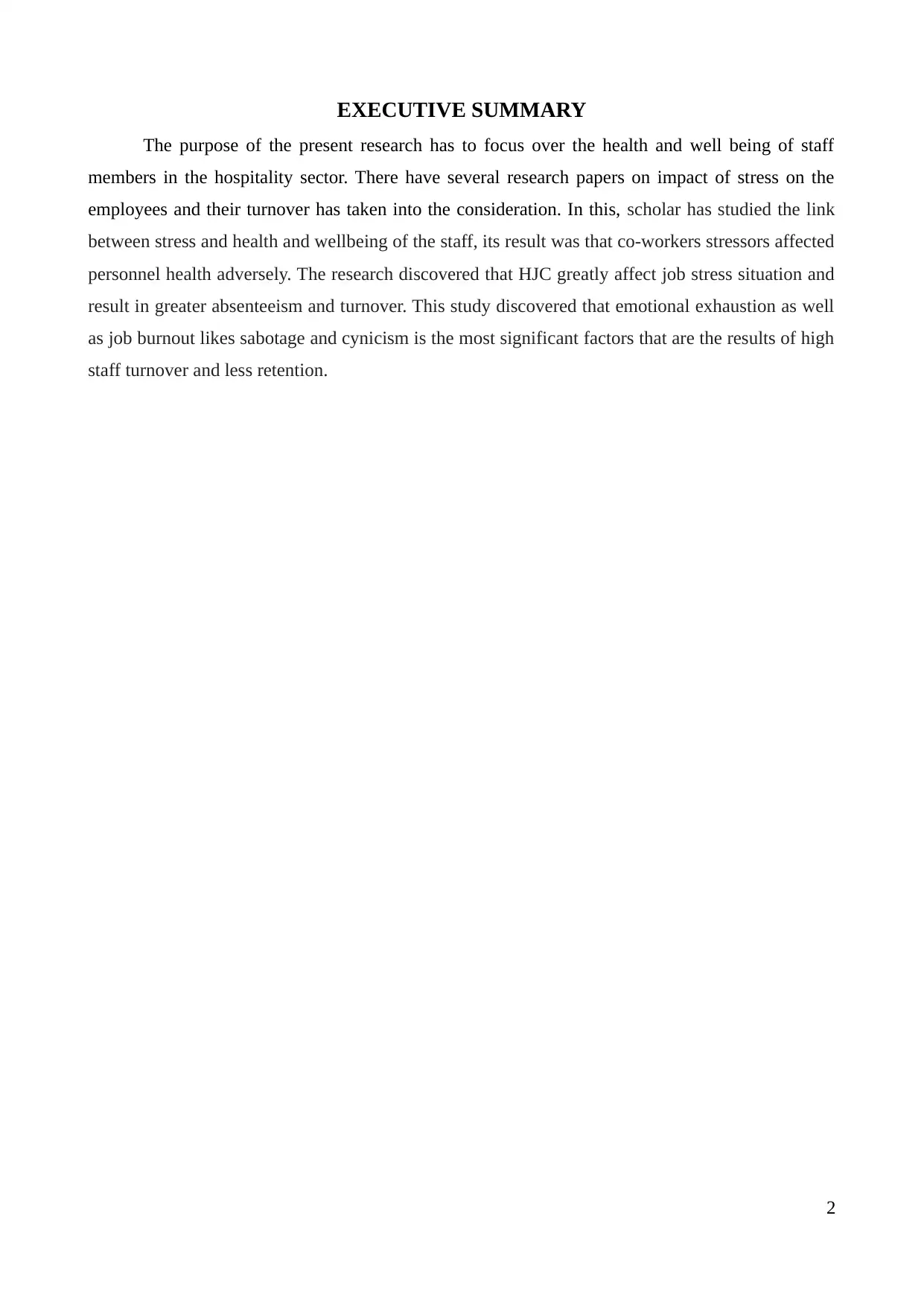
EXECUTIVE SUMMARY
The purpose of the present research has to focus over the health and well being of staff
members in the hospitality sector. There have several research papers on impact of stress on the
employees and their turnover has taken into the consideration. In this, scholar has studied the link
between stress and health and wellbeing of the staff, its result was that co-workers stressors affected
personnel health adversely. The research discovered that HJC greatly affect job stress situation and
result in greater absenteeism and turnover. This study discovered that emotional exhaustion as well
as job burnout likes sabotage and cynicism is the most significant factors that are the results of high
staff turnover and less retention.
2
The purpose of the present research has to focus over the health and well being of staff
members in the hospitality sector. There have several research papers on impact of stress on the
employees and their turnover has taken into the consideration. In this, scholar has studied the link
between stress and health and wellbeing of the staff, its result was that co-workers stressors affected
personnel health adversely. The research discovered that HJC greatly affect job stress situation and
result in greater absenteeism and turnover. This study discovered that emotional exhaustion as well
as job burnout likes sabotage and cynicism is the most significant factors that are the results of high
staff turnover and less retention.
2
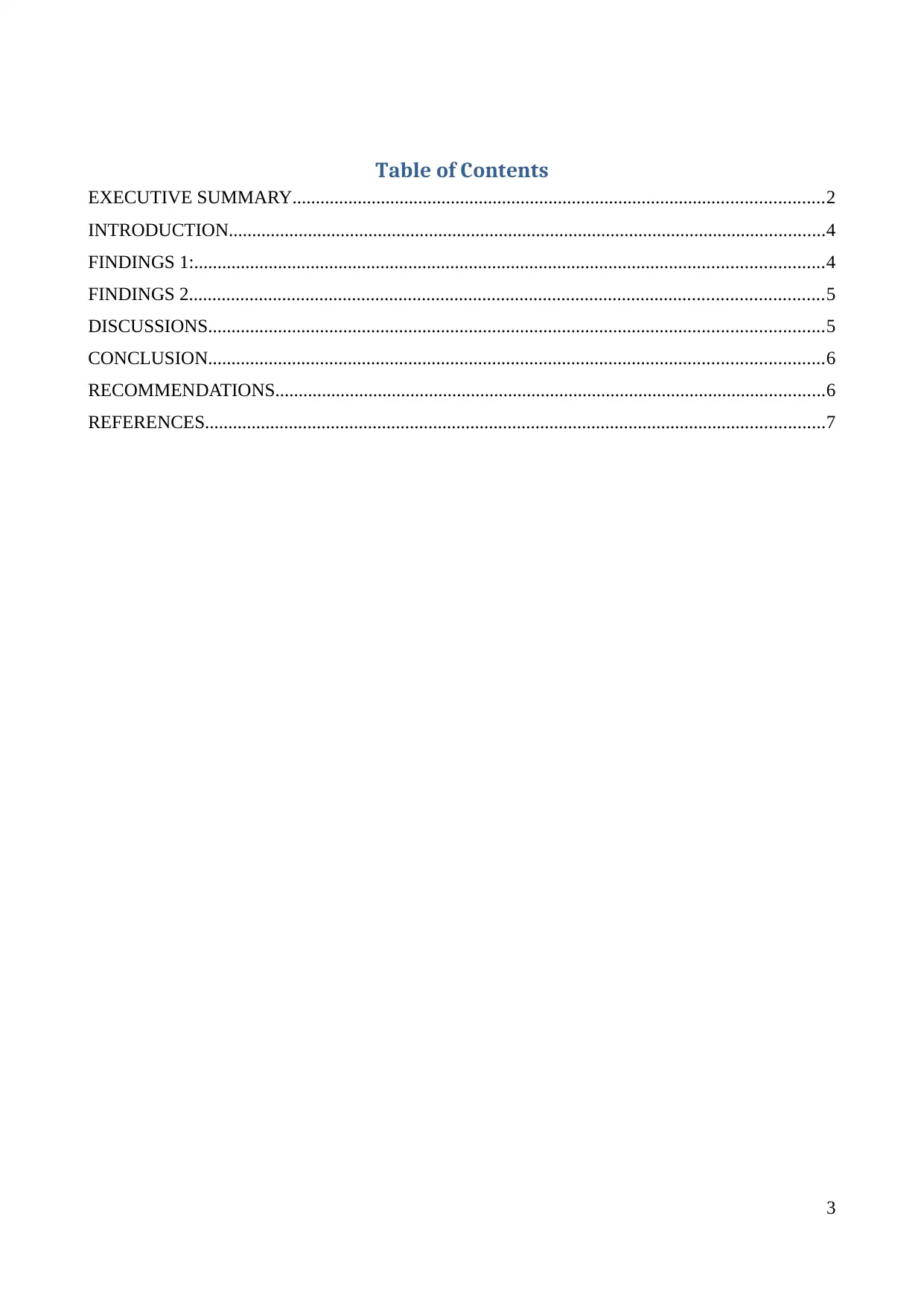
Table of Contents
EXECUTIVE SUMMARY..................................................................................................................2
INTRODUCTION................................................................................................................................4
FINDINGS 1:.......................................................................................................................................4
FINDINGS 2........................................................................................................................................5
DISCUSSIONS....................................................................................................................................5
CONCLUSION....................................................................................................................................6
RECOMMENDATIONS......................................................................................................................6
REFERENCES.....................................................................................................................................7
3
EXECUTIVE SUMMARY..................................................................................................................2
INTRODUCTION................................................................................................................................4
FINDINGS 1:.......................................................................................................................................4
FINDINGS 2........................................................................................................................................5
DISCUSSIONS....................................................................................................................................5
CONCLUSION....................................................................................................................................6
RECOMMENDATIONS......................................................................................................................6
REFERENCES.....................................................................................................................................7
3
⊘ This is a preview!⊘
Do you want full access?
Subscribe today to unlock all pages.

Trusted by 1+ million students worldwide
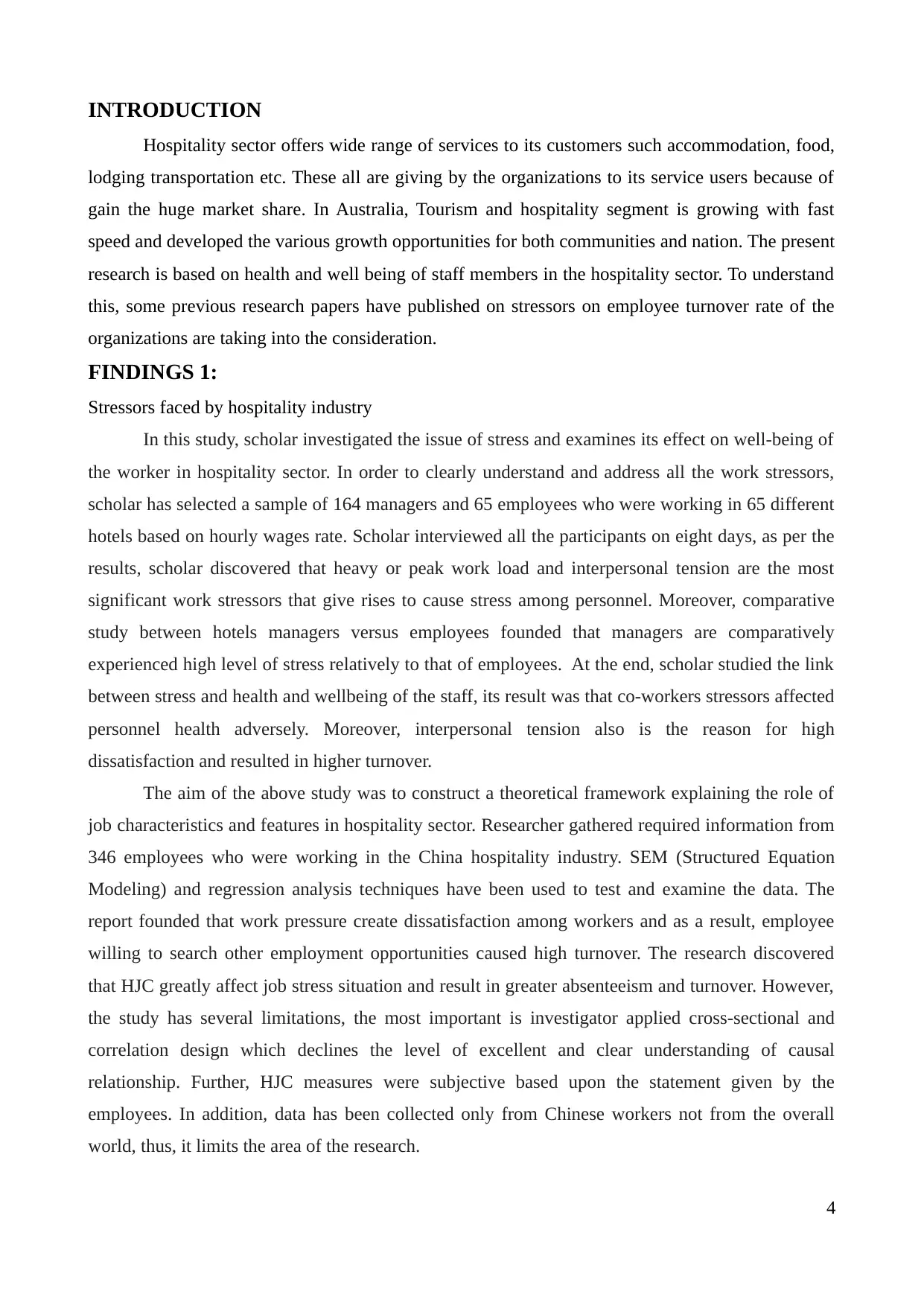
INTRODUCTION
Hospitality sector offers wide range of services to its customers such accommodation, food,
lodging transportation etc. These all are giving by the organizations to its service users because of
gain the huge market share. In Australia, Tourism and hospitality segment is growing with fast
speed and developed the various growth opportunities for both communities and nation. The present
research is based on health and well being of staff members in the hospitality sector. To understand
this, some previous research papers have published on stressors on employee turnover rate of the
organizations are taking into the consideration.
FINDINGS 1:
Stressors faced by hospitality industry
In this study, scholar investigated the issue of stress and examines its effect on well-being of
the worker in hospitality sector. In order to clearly understand and address all the work stressors,
scholar has selected a sample of 164 managers and 65 employees who were working in 65 different
hotels based on hourly wages rate. Scholar interviewed all the participants on eight days, as per the
results, scholar discovered that heavy or peak work load and interpersonal tension are the most
significant work stressors that give rises to cause stress among personnel. Moreover, comparative
study between hotels managers versus employees founded that managers are comparatively
experienced high level of stress relatively to that of employees. At the end, scholar studied the link
between stress and health and wellbeing of the staff, its result was that co-workers stressors affected
personnel health adversely. Moreover, interpersonal tension also is the reason for high
dissatisfaction and resulted in higher turnover.
The aim of the above study was to construct a theoretical framework explaining the role of
job characteristics and features in hospitality sector. Researcher gathered required information from
346 employees who were working in the China hospitality industry. SEM (Structured Equation
Modeling) and regression analysis techniques have been used to test and examine the data. The
report founded that work pressure create dissatisfaction among workers and as a result, employee
willing to search other employment opportunities caused high turnover. The research discovered
that HJC greatly affect job stress situation and result in greater absenteeism and turnover. However,
the study has several limitations, the most important is investigator applied cross-sectional and
correlation design which declines the level of excellent and clear understanding of causal
relationship. Further, HJC measures were subjective based upon the statement given by the
employees. In addition, data has been collected only from Chinese workers not from the overall
world, thus, it limits the area of the research.
4
Hospitality sector offers wide range of services to its customers such accommodation, food,
lodging transportation etc. These all are giving by the organizations to its service users because of
gain the huge market share. In Australia, Tourism and hospitality segment is growing with fast
speed and developed the various growth opportunities for both communities and nation. The present
research is based on health and well being of staff members in the hospitality sector. To understand
this, some previous research papers have published on stressors on employee turnover rate of the
organizations are taking into the consideration.
FINDINGS 1:
Stressors faced by hospitality industry
In this study, scholar investigated the issue of stress and examines its effect on well-being of
the worker in hospitality sector. In order to clearly understand and address all the work stressors,
scholar has selected a sample of 164 managers and 65 employees who were working in 65 different
hotels based on hourly wages rate. Scholar interviewed all the participants on eight days, as per the
results, scholar discovered that heavy or peak work load and interpersonal tension are the most
significant work stressors that give rises to cause stress among personnel. Moreover, comparative
study between hotels managers versus employees founded that managers are comparatively
experienced high level of stress relatively to that of employees. At the end, scholar studied the link
between stress and health and wellbeing of the staff, its result was that co-workers stressors affected
personnel health adversely. Moreover, interpersonal tension also is the reason for high
dissatisfaction and resulted in higher turnover.
The aim of the above study was to construct a theoretical framework explaining the role of
job characteristics and features in hospitality sector. Researcher gathered required information from
346 employees who were working in the China hospitality industry. SEM (Structured Equation
Modeling) and regression analysis techniques have been used to test and examine the data. The
report founded that work pressure create dissatisfaction among workers and as a result, employee
willing to search other employment opportunities caused high turnover. The research discovered
that HJC greatly affect job stress situation and result in greater absenteeism and turnover. However,
the study has several limitations, the most important is investigator applied cross-sectional and
correlation design which declines the level of excellent and clear understanding of causal
relationship. Further, HJC measures were subjective based upon the statement given by the
employees. In addition, data has been collected only from Chinese workers not from the overall
world, thus, it limits the area of the research.
4
Paraphrase This Document
Need a fresh take? Get an instant paraphrase of this document with our AI Paraphraser
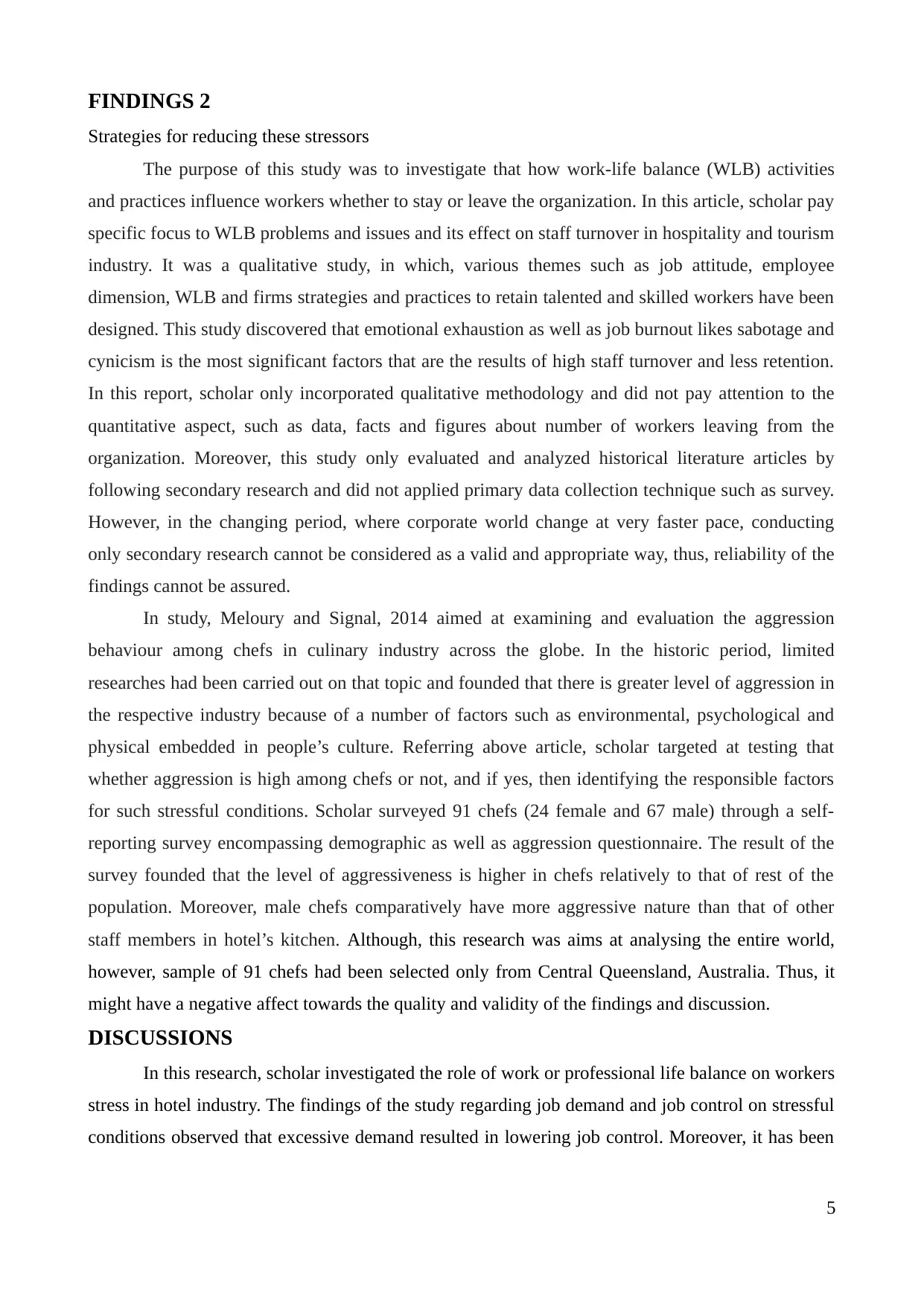
FINDINGS 2
Strategies for reducing these stressors
The purpose of this study was to investigate that how work-life balance (WLB) activities
and practices influence workers whether to stay or leave the organization. In this article, scholar pay
specific focus to WLB problems and issues and its effect on staff turnover in hospitality and tourism
industry. It was a qualitative study, in which, various themes such as job attitude, employee
dimension, WLB and firms strategies and practices to retain talented and skilled workers have been
designed. This study discovered that emotional exhaustion as well as job burnout likes sabotage and
cynicism is the most significant factors that are the results of high staff turnover and less retention.
In this report, scholar only incorporated qualitative methodology and did not pay attention to the
quantitative aspect, such as data, facts and figures about number of workers leaving from the
organization. Moreover, this study only evaluated and analyzed historical literature articles by
following secondary research and did not applied primary data collection technique such as survey.
However, in the changing period, where corporate world change at very faster pace, conducting
only secondary research cannot be considered as a valid and appropriate way, thus, reliability of the
findings cannot be assured.
In study, Meloury and Signal, 2014 aimed at examining and evaluation the aggression
behaviour among chefs in culinary industry across the globe. In the historic period, limited
researches had been carried out on that topic and founded that there is greater level of aggression in
the respective industry because of a number of factors such as environmental, psychological and
physical embedded in people’s culture. Referring above article, scholar targeted at testing that
whether aggression is high among chefs or not, and if yes, then identifying the responsible factors
for such stressful conditions. Scholar surveyed 91 chefs (24 female and 67 male) through a self-
reporting survey encompassing demographic as well as aggression questionnaire. The result of the
survey founded that the level of aggressiveness is higher in chefs relatively to that of rest of the
population. Moreover, male chefs comparatively have more aggressive nature than that of other
staff members in hotel’s kitchen. Although, this research was aims at analysing the entire world,
however, sample of 91 chefs had been selected only from Central Queensland, Australia. Thus, it
might have a negative affect towards the quality and validity of the findings and discussion.
DISCUSSIONS
In this research, scholar investigated the role of work or professional life balance on workers
stress in hotel industry. The findings of the study regarding job demand and job control on stressful
conditions observed that excessive demand resulted in lowering job control. Moreover, it has been
5
Strategies for reducing these stressors
The purpose of this study was to investigate that how work-life balance (WLB) activities
and practices influence workers whether to stay or leave the organization. In this article, scholar pay
specific focus to WLB problems and issues and its effect on staff turnover in hospitality and tourism
industry. It was a qualitative study, in which, various themes such as job attitude, employee
dimension, WLB and firms strategies and practices to retain talented and skilled workers have been
designed. This study discovered that emotional exhaustion as well as job burnout likes sabotage and
cynicism is the most significant factors that are the results of high staff turnover and less retention.
In this report, scholar only incorporated qualitative methodology and did not pay attention to the
quantitative aspect, such as data, facts and figures about number of workers leaving from the
organization. Moreover, this study only evaluated and analyzed historical literature articles by
following secondary research and did not applied primary data collection technique such as survey.
However, in the changing period, where corporate world change at very faster pace, conducting
only secondary research cannot be considered as a valid and appropriate way, thus, reliability of the
findings cannot be assured.
In study, Meloury and Signal, 2014 aimed at examining and evaluation the aggression
behaviour among chefs in culinary industry across the globe. In the historic period, limited
researches had been carried out on that topic and founded that there is greater level of aggression in
the respective industry because of a number of factors such as environmental, psychological and
physical embedded in people’s culture. Referring above article, scholar targeted at testing that
whether aggression is high among chefs or not, and if yes, then identifying the responsible factors
for such stressful conditions. Scholar surveyed 91 chefs (24 female and 67 male) through a self-
reporting survey encompassing demographic as well as aggression questionnaire. The result of the
survey founded that the level of aggressiveness is higher in chefs relatively to that of rest of the
population. Moreover, male chefs comparatively have more aggressive nature than that of other
staff members in hotel’s kitchen. Although, this research was aims at analysing the entire world,
however, sample of 91 chefs had been selected only from Central Queensland, Australia. Thus, it
might have a negative affect towards the quality and validity of the findings and discussion.
DISCUSSIONS
In this research, scholar investigated the role of work or professional life balance on workers
stress in hotel industry. The findings of the study regarding job demand and job control on stressful
conditions observed that excessive demand resulted in lowering job control. Moreover, it has been
5
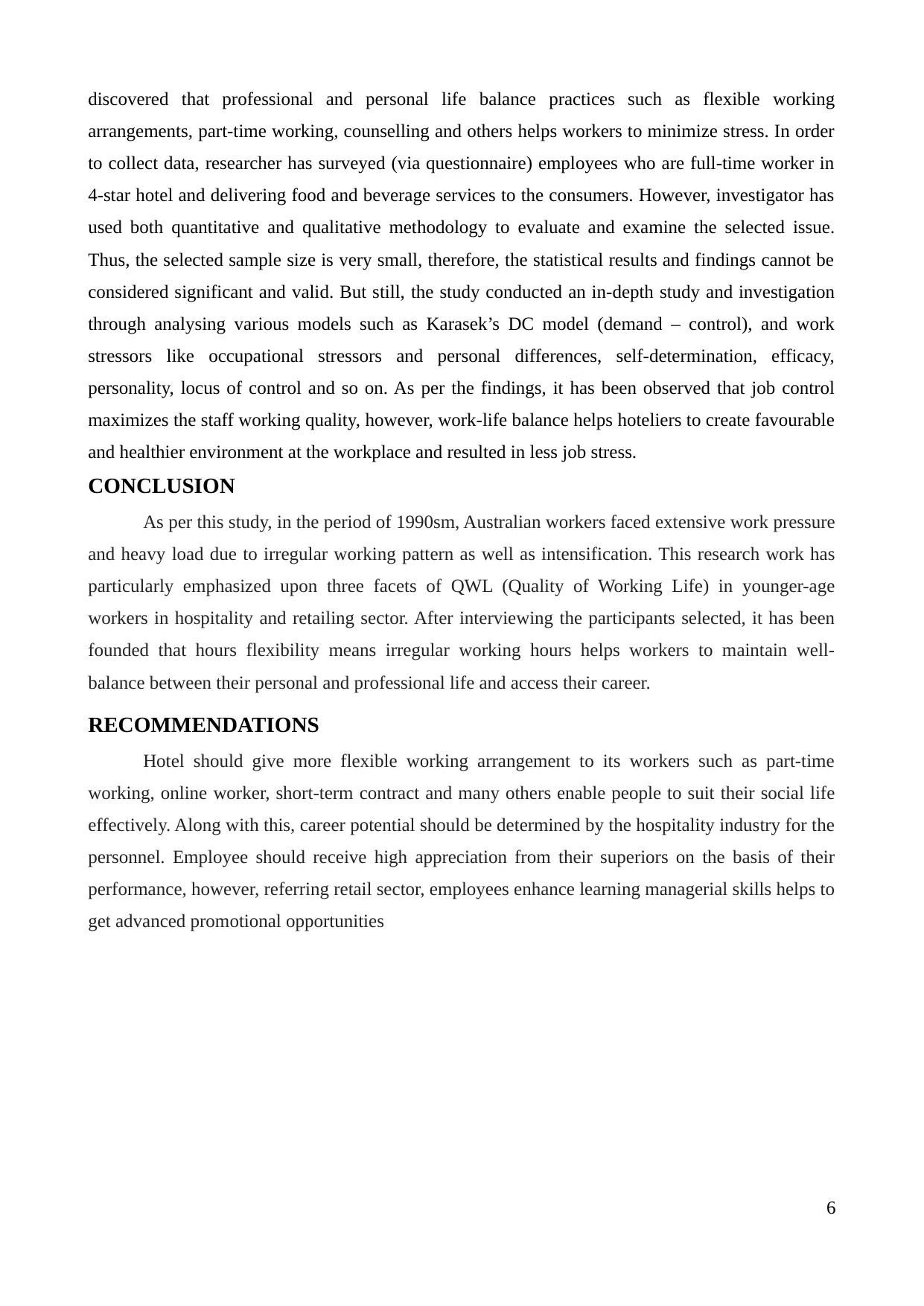
discovered that professional and personal life balance practices such as flexible working
arrangements, part-time working, counselling and others helps workers to minimize stress. In order
to collect data, researcher has surveyed (via questionnaire) employees who are full-time worker in
4-star hotel and delivering food and beverage services to the consumers. However, investigator has
used both quantitative and qualitative methodology to evaluate and examine the selected issue.
Thus, the selected sample size is very small, therefore, the statistical results and findings cannot be
considered significant and valid. But still, the study conducted an in-depth study and investigation
through analysing various models such as Karasek’s DC model (demand – control), and work
stressors like occupational stressors and personal differences, self-determination, efficacy,
personality, locus of control and so on. As per the findings, it has been observed that job control
maximizes the staff working quality, however, work-life balance helps hoteliers to create favourable
and healthier environment at the workplace and resulted in less job stress.
CONCLUSION
As per this study, in the period of 1990sm, Australian workers faced extensive work pressure
and heavy load due to irregular working pattern as well as intensification. This research work has
particularly emphasized upon three facets of QWL (Quality of Working Life) in younger-age
workers in hospitality and retailing sector. After interviewing the participants selected, it has been
founded that hours flexibility means irregular working hours helps workers to maintain well-
balance between their personal and professional life and access their career.
RECOMMENDATIONS
Hotel should give more flexible working arrangement to its workers such as part-time
working, online worker, short-term contract and many others enable people to suit their social life
effectively. Along with this, career potential should be determined by the hospitality industry for the
personnel. Employee should receive high appreciation from their superiors on the basis of their
performance, however, referring retail sector, employees enhance learning managerial skills helps to
get advanced promotional opportunities
6
arrangements, part-time working, counselling and others helps workers to minimize stress. In order
to collect data, researcher has surveyed (via questionnaire) employees who are full-time worker in
4-star hotel and delivering food and beverage services to the consumers. However, investigator has
used both quantitative and qualitative methodology to evaluate and examine the selected issue.
Thus, the selected sample size is very small, therefore, the statistical results and findings cannot be
considered significant and valid. But still, the study conducted an in-depth study and investigation
through analysing various models such as Karasek’s DC model (demand – control), and work
stressors like occupational stressors and personal differences, self-determination, efficacy,
personality, locus of control and so on. As per the findings, it has been observed that job control
maximizes the staff working quality, however, work-life balance helps hoteliers to create favourable
and healthier environment at the workplace and resulted in less job stress.
CONCLUSION
As per this study, in the period of 1990sm, Australian workers faced extensive work pressure
and heavy load due to irregular working pattern as well as intensification. This research work has
particularly emphasized upon three facets of QWL (Quality of Working Life) in younger-age
workers in hospitality and retailing sector. After interviewing the participants selected, it has been
founded that hours flexibility means irregular working hours helps workers to maintain well-
balance between their personal and professional life and access their career.
RECOMMENDATIONS
Hotel should give more flexible working arrangement to its workers such as part-time
working, online worker, short-term contract and many others enable people to suit their social life
effectively. Along with this, career potential should be determined by the hospitality industry for the
personnel. Employee should receive high appreciation from their superiors on the basis of their
performance, however, referring retail sector, employees enhance learning managerial skills helps to
get advanced promotional opportunities
6
⊘ This is a preview!⊘
Do you want full access?
Subscribe today to unlock all pages.

Trusted by 1+ million students worldwide
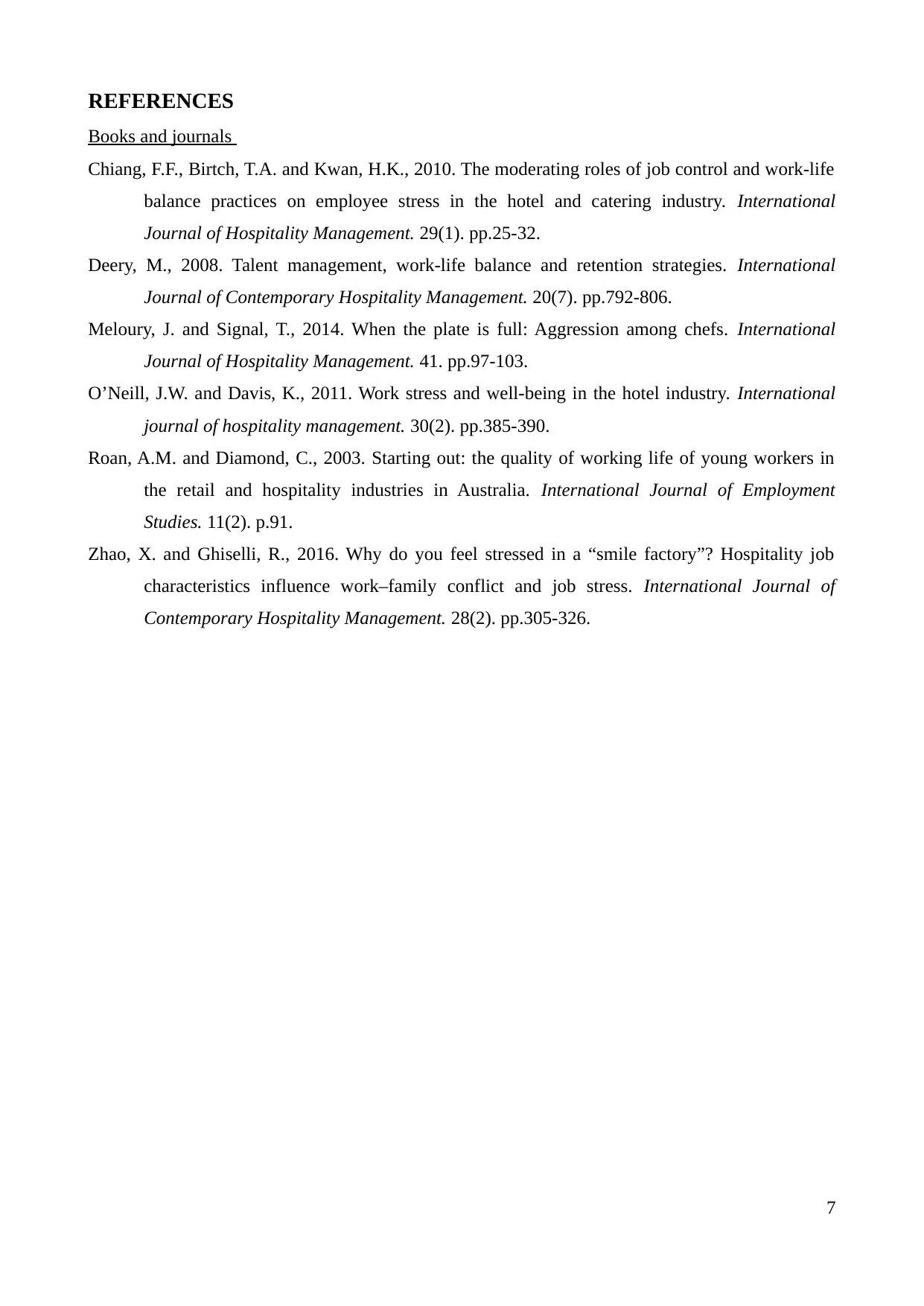
REFERENCES
Books and journals
Chiang, F.F., Birtch, T.A. and Kwan, H.K., 2010. The moderating roles of job control and work-life
balance practices on employee stress in the hotel and catering industry. International
Journal of Hospitality Management. 29(1). pp.25-32.
Deery, M., 2008. Talent management, work-life balance and retention strategies. International
Journal of Contemporary Hospitality Management. 20(7). pp.792-806.
Meloury, J. and Signal, T., 2014. When the plate is full: Aggression among chefs. International
Journal of Hospitality Management. 41. pp.97-103.
O’Neill, J.W. and Davis, K., 2011. Work stress and well-being in the hotel industry. International
journal of hospitality management. 30(2). pp.385-390.
Roan, A.M. and Diamond, C., 2003. Starting out: the quality of working life of young workers in
the retail and hospitality industries in Australia. International Journal of Employment
Studies. 11(2). p.91.
Zhao, X. and Ghiselli, R., 2016. Why do you feel stressed in a “smile factory”? Hospitality job
characteristics influence work–family conflict and job stress. International Journal of
Contemporary Hospitality Management. 28(2). pp.305-326.
7
Books and journals
Chiang, F.F., Birtch, T.A. and Kwan, H.K., 2010. The moderating roles of job control and work-life
balance practices on employee stress in the hotel and catering industry. International
Journal of Hospitality Management. 29(1). pp.25-32.
Deery, M., 2008. Talent management, work-life balance and retention strategies. International
Journal of Contemporary Hospitality Management. 20(7). pp.792-806.
Meloury, J. and Signal, T., 2014. When the plate is full: Aggression among chefs. International
Journal of Hospitality Management. 41. pp.97-103.
O’Neill, J.W. and Davis, K., 2011. Work stress and well-being in the hotel industry. International
journal of hospitality management. 30(2). pp.385-390.
Roan, A.M. and Diamond, C., 2003. Starting out: the quality of working life of young workers in
the retail and hospitality industries in Australia. International Journal of Employment
Studies. 11(2). p.91.
Zhao, X. and Ghiselli, R., 2016. Why do you feel stressed in a “smile factory”? Hospitality job
characteristics influence work–family conflict and job stress. International Journal of
Contemporary Hospitality Management. 28(2). pp.305-326.
7
1 out of 7
Related Documents
Your All-in-One AI-Powered Toolkit for Academic Success.
+13062052269
info@desklib.com
Available 24*7 on WhatsApp / Email
![[object Object]](/_next/static/media/star-bottom.7253800d.svg)
Unlock your academic potential
Copyright © 2020–2026 A2Z Services. All Rights Reserved. Developed and managed by ZUCOL.





